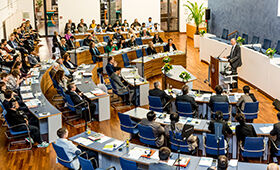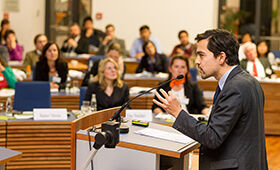International Symposium on TVET Personnel in Magdeburg
For building green cities, skilled workers with the right competencies are the needed. Accordingly, in combination with a conference on green cities, an international symposium on TVET for sustainable development took place on the 25th and 26th of November in Magdeburg.

The Symposium was organized by GIZ’s Academy for International Cooperation unit Competence Development in TVET Magdeburg and its partners, the University of Magdeburg and Fraunhofer Institute for Factory Operation and Automatisation Magdeburg. Together, they form the UNEVOC Centre “TVET for Sustainable Development” Magdeburg. “Professionalization of TVET personnel” was the topic of the symposium. Decision-makers, researchers and practitioners from several countries – 90 participants overall - discussed developments, potentials and requirements in the professionalization of TVET personnel within international cooperation.

High-ranking opening statements were held by State Secretary Marco Tullner, Ministry of Science and Economy, Saxony-Anhalt, Dr. Hans-Joachim Preuß, Managing Director of GIZ and Prof. Dong Qi, Counselor minister of the Embassy of the P.R. China, Berlin. They all emphasized the key role of TVET for sustainable development and the importance of international cooperation in this field. In his key note, Prof. Shyamal Majumdar, Head of UNEVOC international Centre, Bonn, outlined the coming challenges for international TVET cooperation. With the new Sustainable Development Goals (SDG), education and with it TVET has moved to the centre of the global development agenda. Dr. Harry Stolte, head of GIZ UNEVOC Centre Magdeburg, showcased the work of GIZ in international TVET cooperation. With 25 years of experience in developing TVET personnel, GIZ in Magdeburg today is recognized as “International TVET Hub”. Mr. Philipp Phan Lassig from GOVET shared experiences of German development cooperation in TVET. Specifically, he showed how German Dual VET principles can help strengthening TVET personnel in developing countries. Finally, Ms. Alice Vozza from ILO International Training Centre provided insights into the emerging field of Green Jobs at the ILO. These technical contributions paved the way for the discussions in the technical workshops. There, contributors and participants from Asia (Laos, Myanmar, Mongolia, Korea), the South Caucasus region (Georgia, Armenia, Azerbaijan) and Germany discussed current requirements on qualifications for TVET personnel. Key findings were that both, more industry exposure and cooperation as well as better pedagogical training are needed to make TVET personnel ready for the teaching tasks of tomorrow. Over all, the international symposium left no doubt: for sustainable development, developing TVET personnel is and will be a key task for international cooperation.
GIZ is member of the Round Table for International VET Cooperation. GOVET is the secretariat of the Round table.